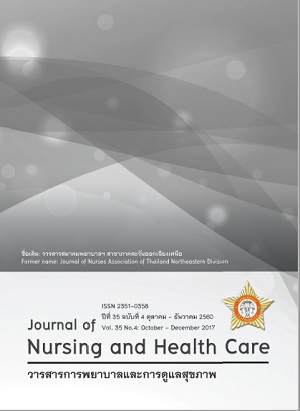การรับรู้สมรรถนะการปฏิบัติพยาบาลทารกแรกเกิดภาวะวิกฤตของผู้ผ่านการอบรมหลักสูตรการพยาบาลเฉพาะทางสาขาเวชปฏิบัติวิกฤตทารกแรกเกิดPerceived Neonatal Critical Care Nurse Practitioner Competencies of Trainees Completing the Neonatal Critical Care Nurse Practitio
คำสำคัญ:
ปฏิบัติการพยาบาลทารกแรกเกิดภาวะวิกฤต สมรรถนะการพยาบาล การพยาบาลเฉพาะทาง วิทยาลัยพยาบาลบรมราชชนนี, neonatal critical care nursing competency nursing specialties boromarajonani college of nursingบทคัดย่อ
การวิจัยครั้งนี้เป็นการวิจัยเชิงสำรวจ เพื่อศึกษาการรับรู้สมรรถนะการปฏิบัติพยาบาลทารกแรกเกิดภาวะวิกฤตของผู้ผ่านการอบรมหลักสูตรการพยาบาลเฉพาะทางสาขาเวชปฏิบัติวิกฤตทารกแรกเกิด กลุ่มตัวอย่างเป็นพยาบาลวิชาชีพที่ผ่านการอบรมหลักสูตรการพยาบาลเฉพาะทางสาขาเวชปฏิบัติวิกฤตทารกแรกเกิด ในปี พ.ศ. 2557-2559 วิทยาลัยพยาบาลบรมราชชนนีพุทธชินราช จังหวัดพิษณุโลก จำนวน 96 คน มีจำนวนแบบสอบถามส่งกลับมา จำนวน 87 คน (คิดเป็นร้อยละ 90.6) เครื่องมือที่ใช้ในการวิจัยคือ แบบสอบถามสมรรถนะการปฏิบัติการพยาบาลทารกแรกเกิดภาวะวิกฤต แบ่งเป็น 6 ด้าน ได้แก่ 1) ด้านการประเมิน และวางแผนการพยาบาล 2) ด้านทักษะการปฏิบัติการพยาบาลทารกแรกเกิดภาวะวิกฤต 3) ด้านภาวะผู้นำ การจัดการ และพัฒนาคุณภาพ 4) ด้านการสื่อสาร และสัมพันธภาพ 5) ด้านเทคโนโลยี สารสนเทศ นวัตกรรม และการวิจัย และ 6) ด้านจริยธรรม และคุณลักษณะเชิงวิชาชีพ ผ่านการตรวจสอบความตรงของเนื้อหาโดยผู้เชี่ยวชาญ จำนวน 3 ท่าน ทดสอบความเชื่อมั่นของเครื่องมือ ได้เท่ากับ 0.98 วิเคราะห์ข้อมูล โดยใช้สถิติความถี่ ร้อยละ ค่าเฉลี่ย และส่วนเบี่ยงเบนมาตรฐาน
ผลการวิจัยพบว่า กลุ่มตัวอย่างมีค่าเฉลี่ยสมรรถนะการปฏิบัติการพยาบาลทารกแรกเกิดวิกฤตของพยาบาลวิชาชีพ โดยรวมอยู่ในระดับมาก (=3.22, S.D.= 0.46) โดยเมื่อพิจารณารายด้าน พบว่า ด้านที่มีค่าเฉลี่ยสูงสุด คือ ด้านทักษะการปฏิบัติการพยาบาลทารกแรกเกิดวิกฤต (=3.32, S.D. = 0.45) รองลงมาได้แก่ ด้านจริยธรรม และคุณลักษณะเชิงวิชาชีพ (=3.30, S.D.= 0.49) การประเมินและวางแผนการพยาบาล (=3.19, S.D.= 0.56 ) ด้านภาวะผู้นำ การจัดการ และพัฒนาคุณภาพ (=3.15, S.D.=0.52) ด้านการสื่อสาร และสัมพันธภาพ (=3.13, S.D. =0.50) ด้านเทคโนโลยี สารสนเทศ นวัตกรรม และการวิจัย (=2.94, S.D.= 0.58 ) ตามลำดับ
ผลการวิจัยครั้งนี้มีข้อเสนอแนะว่าควรมีการพัฒนาหลักสูตรเวชปฏิบัติวิกฤตทารกแรกเกิดให้ผู้เข้ารับการอบรมมีสมรรถนะด้านเทคโนโลยี สารสนเทศ นวัตกรรม และการวิจัยให้สูงขึ้น และควรมีการส่งเสริมให้มีการพัฒนาบุคลากรด้านการพยาบาลเฉพาะทางสาขาเวชปฏิบัติวิกฤตทารกแรกเกิดให้เพิ่มมากขึ้น และรวมทั้งการศึกษาวิจัยเปรียบเทียบการรับรู้สมรรถนะของพยาบาลเฉพาะทางสาขาเวชปฏิบัติวิกฤตทารกแรกเกิดระหว่างผู้บังคับบัญชา ผู้ร่วมงานและผู้ผ่านการอบรม
This survey study was conducted to examine perceptions about neonatal critical care nurse practitioner competencies of trainees completing the neonatal critical care nurse practitioner program. The samples were 96 register nurses completing the neonatal critical care nurse practitioner program at Boromarajonani College of Nursing Buddhachinaraj from 2014-2016. Only 86 questionnaires were sent back (90.6%). The research tool used in this study was the Neonatal critical care nurse practitioner competencies questionnaire, consisted of six parts, including: 1) assessment and planning; 2) nursing implementation skills; 3) leadership, management, and quality improvement; 4) communication and relationship; 5) technology, information, innovation, and research; and 6) moral and professional characteristics. The tool was validated by three experts. The reliability of this questionnaire was 0.98. Data were analyzed by using frequency, percentage, mean, and standard deviation.
The results of this study showed that overall mean scores of perceptions about neonatal critical care nurse practitioner competencies were at high level (=3.22, S.D.= 0.46).Considering in each dimension, the result of the study showed that the highest mean score was the neonatal critical care nursing skill aspect (=3.32, S.D. =0.45), followed by the moral and professional characteristics (=3.30, S.D.= 0.49), the assessment and planning (=3.19, S.D.= 0.56 ), the leadership, management, and quality improvement (=3.15, S.D.=0.52), the communication and relationship (=3.13, S.D. =0.50), and the technology, information, innovation, and research (=2.94, S.D.= 0.58 ), respectively.
The results of this study suggested that the neonatal critical care nurse practitioner program should be developed to improve technology, information, innovation, and research competencies of trainees in this program. Nurses should be more trained in the neonatal critical care nurse practitioner program. Finally, future research is needed to compare perceptions about neonatal critical care nurse practitioner competencies between employers, colleagues, and trainees,



